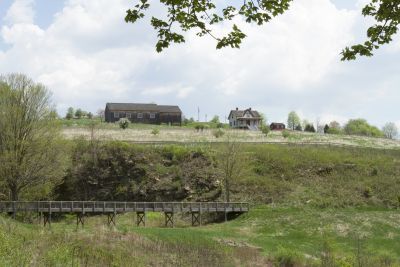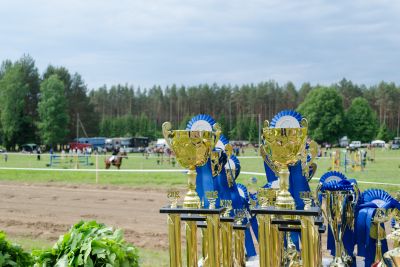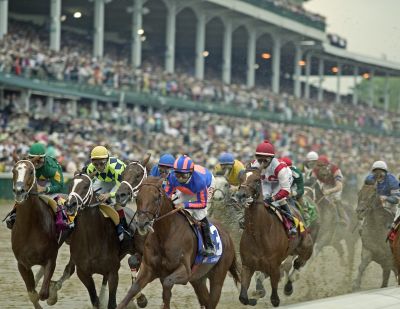

If it hadn't been for four events in history, few people would know anything about Johnstown, PA., a coal and steel city in Western Pennsylvania. The first event -- and it was a major one -- was the famous Johnstown Flood that swept through the community on May 31, 1889, claiming many lives and devastating houses and businesses for miles around.
Johnstown was also just a stone's throw from where actor Charles Bronson was born. Paul Newman made a hockey movie called 'Slapshot' that was filmed in the Johnstown Ice Arena and that co-starred Strother Martin, one of Hollywood's finest character actors.
And then there was the matter of William John Hartack, known to his friends as Bill.
Bill Hartack was born on Dec. 9, 1932 in the tiny coal mining community of Edensburg which many people in the area consider part of Johnson. His father was a farmer who worked in the local coal mines to provide for his family. Ttragically, Bill's mother, Nancy, died from injuries sustained in a car accident on Christmas morning when Bill was only eight years old.
Another tragedy followed a year later when their uninsured home burned down. Neighbors helped the Hartack family build another house on the property. As Bill recalled years later when Whitney Tower, a columnist for Sports Illustrated magazine interviewed him, 'We had no furnace, no central heating, no air conditioning, no electricity, no water and no bathroom. Like many of the other people who lived in the neighborhood, we used an outhouse.'
From that humble beginning, Bill Hartack -- and nobody dared call him Willie -- became the greatest thoroughbred jockey in North America, piling up 4,272 victories and winning $27.5 million in purses. Not bad for a coal miner's son who was rejected by the U.S. Navy because he was too small when he tried to enlist.
Even more incredibly, Bill Hartack managed to finish in the money in nearly 50 percent of the races he entered. A fellow jockey said, 'Bill loved to ride. On some days, he would ride horses in every race on the card. He tackled every race with the full intention of winning, and he never backed down. That was what made him a champion.'
Bill was only 5-4 and weighed 111 pounds. This caused his friends at Black Lick Township High School to make fun of him and it got him into many fights after school. Although he was outweighed by his fellow students, Bill had such a temper and competitive spirit that he never backed down and after a while, the other students left him alone.
Because his widowed father had his hands full digging coal, Bill and his two brothers did all the chores on their small farm. He pitched hay, gathered eggs from the chickens and never complained when his dad assigned him tasks.
After the Navy rejected his enlistment, Anthony Bruno, a family friend, suggested he apply for a job at Charlestown Race Track in West Virginia. He bought a bus ticket and followed Bruno's advice. Norbin 'Junie' Corbin, a trainer and horse owner, admired his spunk and hired him to walk horses, muck stalls and clean tack.
Hartack learned everything he could about horses. After a while, Junie gave him a job of exercising his horses. When Corbin went to Waterford Race Track for the meet, Bill followed him as his exercise boy.
Because of his work on the farm, he developed strong hands, an integral part of being a good jockey. Trainers liked his enthusiasm and his never-give-up attitude. Junie decided to try him out as an apprentice jockey.
In his first two races, Bill, who had turned 19, finished eighth and seventh on two long shots. He won his first race, a $2,000 claimer, on Oct. 14, 1952, when he piloted a five-year-old gelding named Nickelby to victory in a mile and an eighth race. The horse went off at eight to one and the winning parimutuel ticket paid $18.40.

From that point on, there was no stopping Bill Hartack.
Angel Cordero, a legendary jockey, said, 'Bill had these big strong hands and he learned how to use his whip well. He could switch the whip to his left hand and whip the horse to keep it running straight and not drift. That helped him win a lot of races.'
During the 24-day meet at Waterford, which would later be renamed Mountaineer, Hartack rode on 33 horses, won seven races, finished second five times and came in third four times. It was unheard of for an apprentice jockey to finish in the money at a near 50 percent win rate.
Racing fans loved Hartack who quickly became a leading rider at Wheeling Downs and Charlestown. In 1953, he stunned the racing world by winning 350 races and placing second against all the jockeys in North America.
The demand for his riding services became so great that he no longer was asked to ride in cheap claiming races. Owners and trainers wanted him to compete in the biggest paying stakes and allowance races. Soon he was earning $3 million a year for the owners and pocketing a good percentage of those earnings for himself.
Hartack did not have an easy relationship with trainers and owners. Calumet Farms fired him in 1958 after he had a heated argument with a trainer who disagreed with Bill's philosophy of taking a horse to the lead rather than trying to come from behind. Hartack believed that was the best way to win a race, and, true to his nature, would not back down.
He won his first Kentucky Derby in 1957 on a horse called Iron Liege, beating Willie Shoemaker's horse Gallant Man when Shoemaker reached the 16th pole, thought the race was over and stood up in the irons -- allowing Iron Liege to pound past him and win by a nose.

Hartack would go on to win the Kentucky Derby five times, a record achieved only by Eddie Arcaro. He won in 1960 on Venetian Way, 1962 on Decidedly, 1964 on Northern Dancer and 1969 on Majestic Prince.
Feisty and aggressive, the coal miner's kid from Johnstown would never back down from an argument. There was one thing he would not tolerate from anyone -- and that was to be called Willie.
My brother, Legs,I made the mistake of calling him by that name in 1970 when we met him at a night club in Arcadia, CA. My apartment was just a mile from Santa Anita Race Track. I had just gotten married and my wife, Nan, and I were entertaining Legs and his wife, Marie, by taking them out for an evening at the popular night spot.
The place was crowded. Legs recognized Hartack before I did. Bill was dancing with a tall statuesque brunette in high heels who turned out to be a Playboy Bunny. He was well into his cups and enjoying himself. When the dance was finished and we returned to our table, Hartack came over to us and introduced himself.
'I know who you are,' said Legs, smiling. 'You're Willie Hartack.'
Hartack snapped. 'The name's Bill,' he said. 'Willie is that other jockey. Buy me a drink.'
It was Marie's turn to snap. 'We're not buying you a drink,' she said. Marie is Italian and was as feisty as Hartack. He softened and grinned. 'That's okay,' he said. 'Come on out to Santa Anita Race Track tomorrow. I'm riding four horses. Bet on me and you'll make money. The first three horses are sure winners. The fourth one I'm not sure about.'
We bought Bill a drink and went to the race track the next day. It was beautiful and sunny. Like Hartack had advised, we bet on him on his first three races -- and lost. In the fourth race, we bet on another horse. And of course, Hartack's horse ran away with the race.
Nan turned to me with a smile. 'It probably took him those three races to sober up,' she said.
Bill Hartack's racing career lasted from 1953 to 1974. After his retirement, he got bored and returned to racing in Hong Kong, where weight restrictions are not as stringent as in the United States, and raced there from 1978-80.
He returned to the U.S. and went to work as a steward at Louisiana Downs Race Track. Although Bill was popular with racing fans around the world and loved women, he never married and lived his life as a loner. He died of natural causes in a hunting cabin near the town of Freer, Texas on Nov. 26, 2007, just two weeks short of his 75th birthday.
Author: Geno Lawrenzi Jr.
(Geno Lawrenzi Jr. is an international journalist, magazine author and ghostwriter. If you have a unique gambling story to share with him, you may qualify for a cash award. Send your story with all the details to glawrenzi@gmail.com ).
Your feedback
Please enter your comment.
Your comment is added.




